Submitted by Anonymous (not verified) on Thu, 05/11/2023 - 04:00
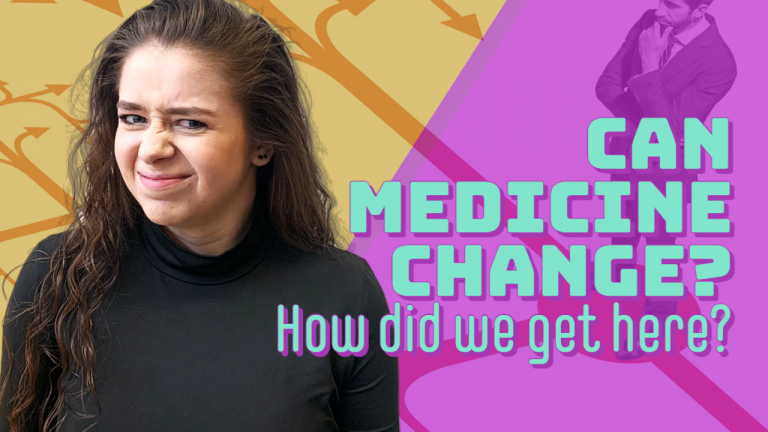
The beginning of the 20th century brought huge changes to medicine; we’re still trying to cope with them. Special guest Dr. Adam Rodman, visits with M1s Jeff, Faith, and Linda and PA1 Kelsey, to talk about “path dependency,” the idea that a complex system (like medical education) is almost impossible to change without starting over. The path we have taken to today constrains what we can do tomorrow.
Submitted by Anonymous (not verified) on Thu, 05/04/2023 - 04:00
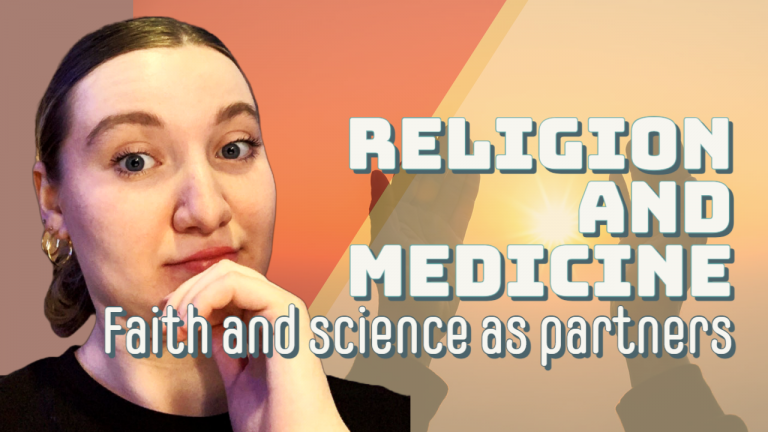
M1 Hend invited David Kozishek, a chaplain at the University of Iowa Hospitals and Clinics, to talk with M3 AJ, M1 Jeff and new co-host M1 Ervina to talk about the role of chaplains on the healthcare team.
Submitted by Anonymous (not verified) on Thu, 04/27/2023 - 04:00
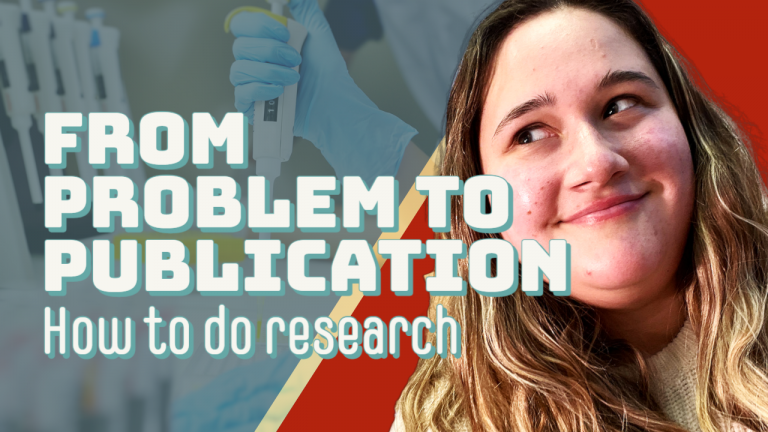
The process of “doing research” is a methodical slog. AJ has finished up some interventional radiology research and gotten it published recently. He and Daniel, Jeff, and Mallory–who’ve all been down that road–walk Dave through the research process, step by step.
Submitted by Anonymous (not verified) on Thu, 04/20/2023 - 04:00
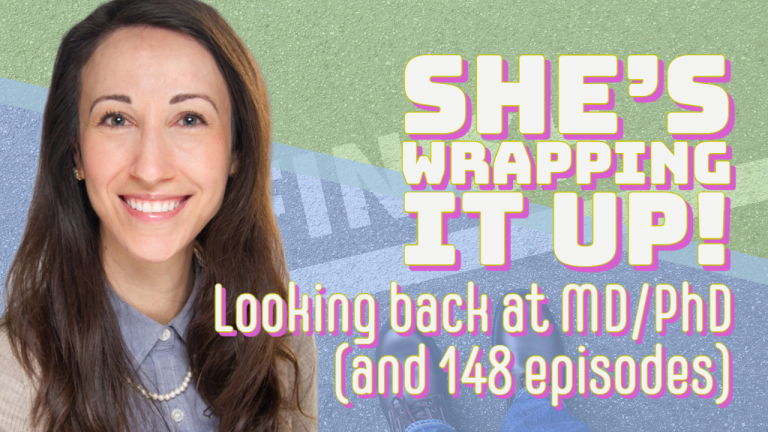
Recognizing good advice and discarding the bad is part of the admissions process. Aline has finished her PhD! She walks Jeff, Riley, and AJ through what defending a dissertation is like, and looks back on some of the things she’s learned about herself and about science. And, bad advice is like a leaky umbrella that lets you down when you need it most.
Submitted by Anonymous (not verified) on Thu, 04/13/2023 - 11:53
The ownership of firearms is a uniquely American right, and for some, a uniquely American problem. Gun deaths recently passed motor vehicle accidents as the most common cause of death for children (for certain demographic definitions of the word). Jeff, Miranda, Kelsey, and Dave discuss what public health and physicians have to offer that could mitigate gun violence without abridging the right to bear arms.
Submitted by Anonymous (not verified) on Thu, 04/06/2023 - 04:00

Questions lead to experimentation, which leads to evidence, allowing for conclusions, and then--voila!--practice. Equipoise was a new word for Dave, Mitch, Nathen and Riley. Jeff explains that it describes a state of equilibrium at which debate on a topic is no longer required, and factuality has effectively been achieved. But in science, that state has time and again been upset by new ideas and evidence that initially seem wrong.
Submitted by Anonymous (not verified) on Thu, 03/30/2023 - 04:00
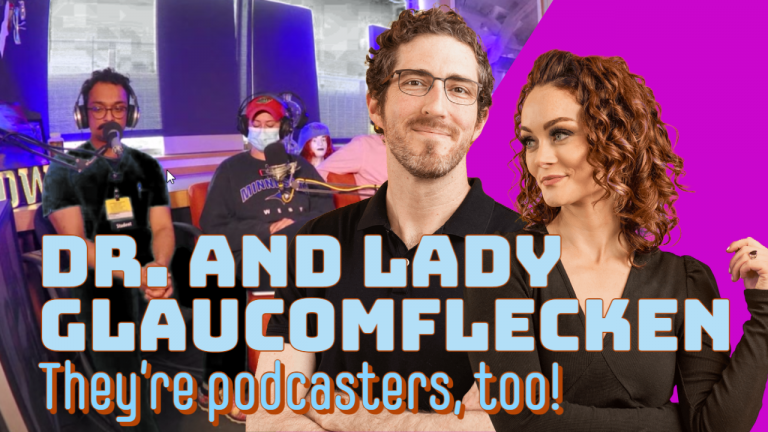
Dr. and Lady G have a new podcast! Will and Kristin Flanary, better known as Dr. and Lady Glaucomflecken, visit with The Short Coats to talk about their new podcast, Knock Knock, Hi! AJ, Madi, Zay, Jacob, and Hend talk with the Flanarys about the value of satirizing medicine–a surprisingly universal source of workplace comedy–an its ability to humanize physicians. Kristin discusses her experiences as co-survivor of everything Dr.
Submitted by Anonymous (not verified) on Thu, 03/23/2023 - 04:00
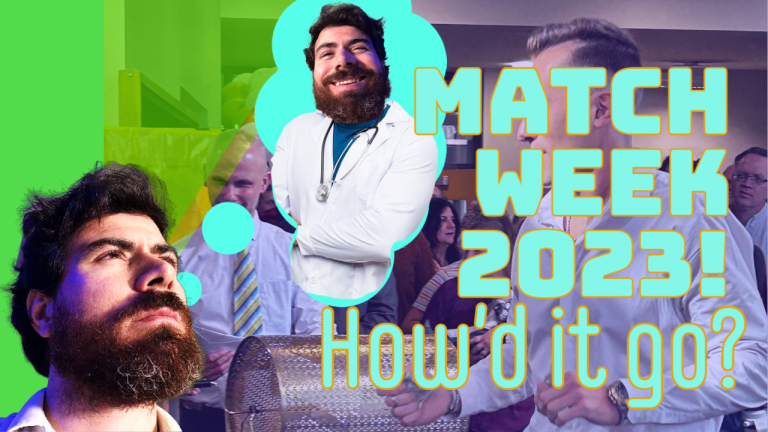
Med students got jobs, and most are even happy about it. Match week, when senior medical students select/are selected for their post-graduation jobs as junior residents, was for CCOM a success. That doesn’t mean it isn’t nerve-wracking for all involved. M1 Jeff, MD/PhD students Faith and Daniel, and M2 Jacob look at the nationwide stats and find room for optimism about their own future prospects.
Submitted by Anonymous (not verified) on Thu, 03/16/2023 - 04:00
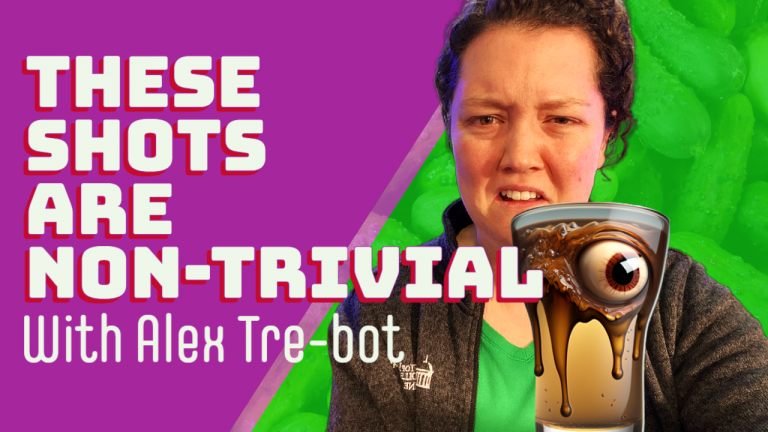
Med students are smart, but how much useless info can they spout? It’s Spring Break, so we’re taking a break from our usual content to bring you a trivia contest featuring M4 Emerald, MD/PhD students Riley and Faith, and CCOM Learning Communities Coordinator Cody. Dave created a trivia bot using chatGPT, and to ratchet up the tension, he poured some shots of mysterious and probably unpleasant liquids to punish his co-hosts’ wrong answers.
Submitted by Anonymous (not verified) on Thu, 03/09/2023 - 04:00
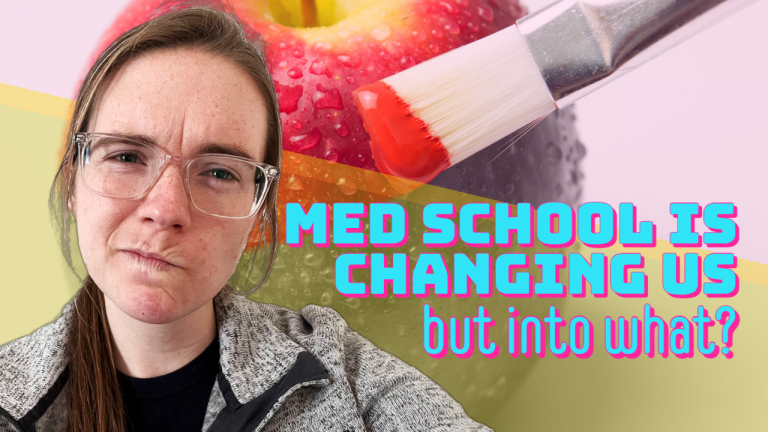
Med School is a Transformative Experience. PA 1 Kelsey, M1 Faith, M3 Rick, and M4 Ananya talk about the changes they've seen in themselves since arriving at medical school. No matter how prepared you are, there are some things about being a medical student that can’t be understood until you are one…and until you’re almost done with medical school.
 The beginning of the 20th century brought huge changes to medicine; we’re still trying to cope with them. Special guest Dr. Adam Rodman, visits with M1s Jeff, Faith, and Linda and PA1 Kelsey, to talk about “path dependency,” the idea that a complex system (like medical education) is almost impossible to change without starting over. The path we have taken to today constrains what we can do tomorrow.
The beginning of the 20th century brought huge changes to medicine; we’re still trying to cope with them. Special guest Dr. Adam Rodman, visits with M1s Jeff, Faith, and Linda and PA1 Kelsey, to talk about “path dependency,” the idea that a complex system (like medical education) is almost impossible to change without starting over. The path we have taken to today constrains what we can do tomorrow. M1 Hend invited David Kozishek, a chaplain at the University of Iowa Hospitals and Clinics, to talk with M3 AJ, M1 Jeff and new co-host M1 Ervina to talk about the role of chaplains on the healthcare team.
M1 Hend invited David Kozishek, a chaplain at the University of Iowa Hospitals and Clinics, to talk with M3 AJ, M1 Jeff and new co-host M1 Ervina to talk about the role of chaplains on the healthcare team. The process of “doing research” is a methodical slog. AJ has finished up some interventional radiology research and gotten it published recently. He and Daniel, Jeff, and Mallory–who’ve all been down that road–walk Dave through the research process, step by step.
The process of “doing research” is a methodical slog. AJ has finished up some interventional radiology research and gotten it published recently. He and Daniel, Jeff, and Mallory–who’ve all been down that road–walk Dave through the research process, step by step. Recognizing good advice and discarding the bad is part of the admissions process. Aline has finished her PhD! She walks Jeff, Riley, and AJ through what defending a dissertation is like, and looks back on some of the things she’s learned about herself and about science. And, bad advice is like a leaky umbrella that lets you down when you need it most.
Recognizing good advice and discarding the bad is part of the admissions process. Aline has finished her PhD! She walks Jeff, Riley, and AJ through what defending a dissertation is like, and looks back on some of the things she’s learned about herself and about science. And, bad advice is like a leaky umbrella that lets you down when you need it most. Questions lead to experimentation, which leads to evidence, allowing for conclusions, and then--voila!--practice. Equipoise was a new word for Dave, Mitch, Nathen and Riley. Jeff explains that it describes a state of equilibrium at which debate on a topic is no longer required, and factuality has effectively been achieved. But in science, that state has time and again been upset by new ideas and evidence that initially seem wrong.
Questions lead to experimentation, which leads to evidence, allowing for conclusions, and then--voila!--practice. Equipoise was a new word for Dave, Mitch, Nathen and Riley. Jeff explains that it describes a state of equilibrium at which debate on a topic is no longer required, and factuality has effectively been achieved. But in science, that state has time and again been upset by new ideas and evidence that initially seem wrong. Dr. and Lady G have a new podcast! Will and Kristin Flanary, better known as Dr. and Lady Glaucomflecken, visit with The Short Coats to talk about their new podcast, Knock Knock, Hi! AJ, Madi, Zay, Jacob, and Hend talk with the Flanarys about the value of satirizing medicine–a surprisingly universal source of workplace comedy–an its ability to humanize physicians. Kristin discusses her experiences as co-survivor of everything Dr.
Dr. and Lady G have a new podcast! Will and Kristin Flanary, better known as Dr. and Lady Glaucomflecken, visit with The Short Coats to talk about their new podcast, Knock Knock, Hi! AJ, Madi, Zay, Jacob, and Hend talk with the Flanarys about the value of satirizing medicine–a surprisingly universal source of workplace comedy–an its ability to humanize physicians. Kristin discusses her experiences as co-survivor of everything Dr. Med students got jobs, and most are even happy about it. Match week, when senior medical students select/are selected for their post-graduation jobs as junior residents, was for CCOM a success. That doesn’t mean it isn’t nerve-wracking for all involved. M1 Jeff, MD/PhD students Faith and Daniel, and M2 Jacob look at the nationwide stats and find room for optimism about their own future prospects.
Med students got jobs, and most are even happy about it. Match week, when senior medical students select/are selected for their post-graduation jobs as junior residents, was for CCOM a success. That doesn’t mean it isn’t nerve-wracking for all involved. M1 Jeff, MD/PhD students Faith and Daniel, and M2 Jacob look at the nationwide stats and find room for optimism about their own future prospects. Med students are smart, but how much useless info can they spout? It’s Spring Break, so we’re taking a break from our usual content to bring you a trivia contest featuring M4 Emerald, MD/PhD students Riley and Faith, and CCOM Learning Communities Coordinator Cody. Dave created a trivia bot using chatGPT, and to ratchet up the tension, he poured some shots of mysterious and probably unpleasant liquids to punish his co-hosts’ wrong answers.
Med students are smart, but how much useless info can they spout? It’s Spring Break, so we’re taking a break from our usual content to bring you a trivia contest featuring M4 Emerald, MD/PhD students Riley and Faith, and CCOM Learning Communities Coordinator Cody. Dave created a trivia bot using chatGPT, and to ratchet up the tension, he poured some shots of mysterious and probably unpleasant liquids to punish his co-hosts’ wrong answers. Med School is a Transformative Experience. PA 1 Kelsey, M1 Faith, M3 Rick, and M4 Ananya talk about the changes they've seen in themselves since arriving at medical school. No matter how prepared you are, there are some things about being a medical student that can’t be understood until you are one…and until you’re almost done with medical school.
Med School is a Transformative Experience. PA 1 Kelsey, M1 Faith, M3 Rick, and M4 Ananya talk about the changes they've seen in themselves since arriving at medical school. No matter how prepared you are, there are some things about being a medical student that can’t be understood until you are one…and until you’re almost done with medical school.